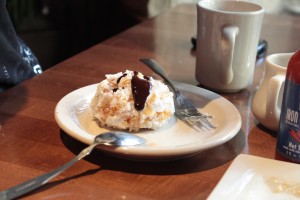Feeling Fat? Join the Turkey, Bacon Sandwich and Cheesecake Club
Thanks to all the hoopla surrounding the rising rate of obesity in America and First Lady Michelle Obama’s promise to make us all a little more fit, the media has, of late, been placing a good deal more emphasis on the concept of “emotional eating.” It’s part of our cultural jargon now. Though, truth be told, it’s always been part of my jargon and the jargon of a lot of people I know, women, in particular.
When we’re feeling emotionally cruddy, we have a tendency to do one of two things: eat or buy shoes. I don’t really know where this response comes from. I can trace it back at least to college, where Susannah and I often found ourselves showering ice cream in chocolate sprinkles at the Gettysburg Dairy Queen following boyfriend break-ups and the other traumas of young adulthood. Something about sugar seemed to make it all better, at least so long as we kept eating it.
And how do women typically stage “interventions” when one of their number is in crisis? That’s right. We bring food or take the victim to the food with a dinner on the town. Almost anything with a high caloric content will work—soft doughy pretzels made by the Mennonites and drenched in hot cheese, oozing turkey and cheese croissants pelted with crab dip, decadent raspberry chocolate cheesecake. You name the problem, we’ve got the carb-loaded drug to treat it.
The problem is after we’ve visited the “Cupcake Bus” in Nashville or the “Chocolate Lounge” in Asheville, the thing that has caused the crisis is still there in addition to a couple of extra inches around our waistlines. Then the food guilt kicks in. You have one of two options for curing that: eat until you feel good (kind of like drinking until she looks pretty) or starve yourself for three weeks to regain the figure you somehow lost in one sitting at the really delicious bistro by the train station.
I realize I’m covering sensitive territory here. When I once joked to a friend about her obsession with chocolate (and honestly, what woman with hormones does not have an obsession with chocolate?), she chided me for being a bit too open about “her problem.” The problem isn’t so much the chocolate obsession…or even the two extra inches around the waistline that the chocolate obsession leads to.
The problem is all in our heads. (Yes, men, if you are reading this, I really did say that: “it’s all in our heads.”)
It’s the food-guilt cycle that’s the problem: have crisis (sometimes about how overweight we are), eat to make it all feel better, then feel guilty for the emotional eating, go back into self-loathing over the crisis or the love handles we’re sure we will develop by the following morning. In severe cases, women develop potentially fatal eating disorders because of this cycle.
What’s going on here?
I’ll tell you: Jillian Michaels is going on here. Jackie Warner is going on here. And countless other hot bods we see on the cover of everything from Women’s Health to Ladies’ Home Journal. And let’s not even get into the Victoria’s Secret catalog that comes in the mail every week. (Why I have no idea because heaven knows, there’s nothing in there that would look good on a woman who thinks it’s perfectly acceptable to eat pizza to cure stress.)
But as women, we are inundated daily with what we are supposed to look like, and rarely do our bodies fit the bill. We chastise our thin and lovely friends who claim to have pot bellies underneath their clothes, but are somehow incapable of seeing our own hypocrisy. It does not matter what our bodies look like; they are never good enough…at least not to us. Small-chested friends of mine bemoan their lack of curves. I bemoan having too many, longing to look like the lithe and thin models I see photographed on Paris runways. Either that or wishing to myself that the cultural norm of today was that of the voluptuous movie stars of the 1950s—where breasts and hips and curving thighs were perfectly acceptable assets.

You may be smiling now, Dorothy, but you know that frozen cocktail is going straight to your hips, right?
Nothing made it all hit home like a weekend shopping trip with my dance instructor, Dorothy, to buy new costumes for the upcoming performance season. She is thin as a rail (though, being a self-critical female, she denies it up and down). I came along, I think, as the representative of the more curvaceous members of the dance team. And it didn’t take too many outfit “try-ons” before I felt almost as down in the dumps as I do after the yearly quest to update my bathing suit. I think the last number I tried on was a glitzy lavender and silver piece with sequins that accentuated my curves a little too much. Dorothy remarked on the prominence of my “upper half.” I looked in the mirror and decided my curves made me look fat, definitely not lovely or desirable. Yep, I was done and left in no small befuddlement over the weird irony that Dorothy found herself pleased with anything that gave what she claims is the “illusion” of curves, while I was enamored with anything that de-emphasized hips, breasts, and thighs.
We were like two teenagers, one with straight hair, the other with curly, each desiring the perceived better assets of what we ourselves did not possess. The women in my dance class tend to divide themselves into two self-conscious camps: the “haves” and the “have- nots.” The “haves” are constantly complaining over their womanly figures; the “have- nots” crack self-deprecating jokes about how they “ain’t got nothing.”
Nobody in the room is happy. And, I daresay, this phenomenon is all too “normal,” insofar as hating one’s body is normal in our culture.

Curing the blues with a Mexican fried donut in San Antonio: note the powdered sugar, oozing caramel, and dripping chocolate sauce
Dorothy and I treated our onslaught of poor body image induced depression by eating, of course, even though it would have been healthier, if not cheaper, to buy shoes. I drowned my sorrows in a Dr. Pepper and a bag of Cadbury mini-eggs. She chose a box of donut holes to assuage the pain (though she admitted that the purchase that day of a pair of pants she could actually fit into was making her feel a bit better).
Then we both vowed to start near starvation diets on Sunday and exercise three hours every day. It’s not that we don’t see the absurdity of our psychology here. We see it. We hate Jillian Michaels, not just because she’s a bitch, but because she makes us feel less than adequate. Nevermind that since our careers don’t involve pumping iron 12 hours a day at the gym, it’s really not possible for us to look like that anyway. Logic left this equation with the consumption of the turkey, havarti, bacon, and tomato sandwich on foccacia at lunchtime (and it tasted really good, by the way—food orgasm of the highest degree).
But was it worth it? Was it worth the self-loathing that would follow to eat that decadent sandwich?
Hard call. There is one woman in our dance class who says she has been advised that the way to eliminate her pot belly is to give up potato chips, pizza, and wine. She claimed, not without empathy and understanding from the rest of us, that life really wouldn’t be worth living if she had to give up those things.
Food is pleasurable after all, firing off the same areas of the brain that good sex and exercise do. So one could logically conclude perhaps that we should treat crises with more sex and exercise and less food and shoes. (And did I mention my closet is overflowing with shoes? I think great shoes also fire the pleasure centers of the brain.)
But how often do you see a woman trying to comfort a friend who has just broken up with the love her life by saying, “Hey, how about we go for a hike?” I remember once Susannah and I tried it. She offered up a hike at Great Falls instead of shoe shopping and eating. But somehow the shoes and the great chicken Caesar salads at Panera Bread seemed to call us harder.
I wonder how we get this way. My mother-in-law claims it’s Barbie dolls that inspire all our body image issues. I think she’s off the scent though. My four-year-old daughter loves Barbies, and she has the best body image of any female I know. She loves to admire herself in the mirror, has no qualms about running through the house stark naked, and frequently says to herself, “Don’t I look pretty?” Then she’ll pick up a Barbie doll, pull out a fantastic evening gown for her, and hand the doll to me with the request: “Will you dress her, Mommy? I want her to look pretty like I do”
Wow. Really?
When was the last time I felt sorry for a Victoria’s Secret model and wished she could be as pretty as I am? Yeah…never.
So I’m guessing we, as humans, have some natural inclination to like ourselves, including the way we look. And then somewhere around school age begins the slow process of inspired self-loathing. My daughter tells me the boys at school make fun of her unruly curly hair. I asked her how she responds to this. “I take the ‘monster’ clip with the teeth on it out of my hair and pinch them with it,” she says matter-of-factly. I can’t really argue with this solution, so I say nothing.
I begin to think she is onto something, that maybe the next time I find myself criticizing my body, I should treat my psyche like my daughter does the mean boys on the school bus and snap myself on the wrist with a rubber band or something.
Easier said than done, of course.
But whose standard are we trying to live up to anyway? It’s certainly not that of our husbands and lovers, most of whom are just happy we’re willing to get naked with them occasionally and couldn’t care less about our love handles, if they even notice them. And competitive though women tend to be with one another, we certainly don’t dump our female friends because they’re carrying around a few extra pounds. So why do we ourselves believe we are unlovable unless we are perfect when we have so much evidence to the contrary? Is it just because an air-brushed model seems to stare at us with condemnation from her place in the magazine rack in the grocery store checkout line?
We have to be careful of this condemnation of strangers, valuing too much the opinion of a culture that asks us to starve ourselves for happiness.
Dorothy said she was feeling particularly bad about herself when she noticed her dance partner was worn out from doing lifts in a song recently. She suspected it was because she’d put on a few pounds and said to him, “I need to lose some weight, don’t I?”
Gallantly, he replied, “No, no, I just need to do more push-ups.”
This response is not so different from that of my daughter as she watches me curl my hair and put on lipstick in the morning. “Mommy, you look beautiful,” she says with beaming admiration. “Like a Cover Girl.”
And I smile a little, thinking she is full of childish misperception of what beauty is. But then she has always been hopelessly honest, too, a trait she learned from me. “Don’t wear that jacket, Mommy. It is ugly,” she has said of my choice in wardrobe. And then sometimes, “Those shoes are great, Mommy. Buy those.” And I do. Trusting somehow her gut reaction to aesthetics.
It is not unlike the reaction of a man to his wife. He finds her beautiful, not because she looks like a Victoria’s Secret model, but because she loves him, admires him, and is willing to share that most secret part of herself with him—that vulnerable body she is scared to love.




Gosh… we’ve eaten our way around the world, haven’t we?? Don’t forget Lobster Bisque in Maine! 🙂 And I’m STILL working off that gelato from Venice and my lasagna from Rome! 😛